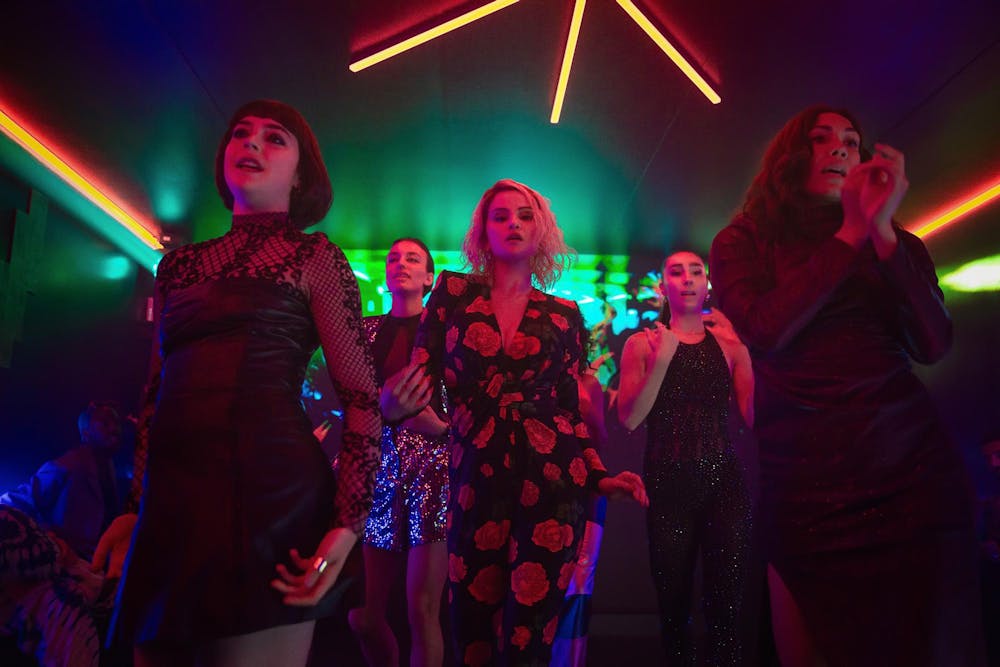“Emilia Pérez” premiered at the 77th Cannes Film Festival on May 18, where it won the Jury Prize and the Best Actress award, which was awarded to the film’s female ensemble. The film was released on Netflix on Nov. 13.
The musical film follows an underappreciated lawyer, Rita Mora Castro (Zoe Saldaña), who is hired to help a prominent cartel leader in Mexico, Emilia Pérez (Karla Sofía Gascón), transition and disappear, sending her wife, Jessi Del Monte (Selena Gomez) and children to Switzerland while she faked her death. Four years later, Emilia and Rita meet again, and this time Emilia asks the lawyer to help her to bring her wife and children back to Mexico to live with her, while posing as the kids’ aunt. While back in Mexico, Emilia and Rita start a non-profit organization that identifies the bodies of cartel victims as a way for Emilia to reconcile with her criminal past.
While the film has gotten fairly positive reception from critics and many audiences, others have argued the film does not offer good transgender representation. As a cisgender person, I don’t have a complex, personal understanding of trans representation, but after watching the film I do think it was trying to make a statement on so many things that it ended up not actually saying much at all.
I was initially drawn in by the film’s premise, as the idea of a crime lord transitioning seemed like an interesting and distinctive concept, but this plot only makes up the first 40 minutes of the film. While the topic is already a big and important one to cover, the film also includes plot lines about the Mexican drug war, women’s rights and abusive relationships, not to mention the intense family drama going on throughout the film. With all of these very complicated and important topics put into just one film, it seemed like none of the concepts were able to be developed and fleshed out how they should have been. Even with a wide range of plot points throughout the film, it still felt pretty long and boring to me. I kept checking the time left in the film and was constantly shocked (and displeased) to find how much runtime remained out of the lengthy 2 hour and 10-minute film.
Additionally, I was excited to see this film because it is a musical, and I am usually a big fan of musicals. However, I really did not like the music in this film. Most of the music barely even felt like fully developed songs, and more like the characters talking over a beat. There were a couple songs that, when paired with impactful visuals, did provide some powerful moments; however, for the most part, the music just felt unnecessary.
Although, I must say the acting in the film was phenomenal with really powerful performances from Saldaña, Gascón and Gomez. They were the heart of the film and helped bring the story to life. The visuals were also impressive and gave the film a very distinctive look that made some of the important moments much more striking.
While I enjoyed seeing a film that included a powerful trans main character, it is unfortunate that the film seems to have fallen into common stereotypes and tropes of inauthentic trans representation such as tragic trans woman, trans woman abandons her wife and kids while transitioning, the transition treated as a death, and deadnaming along with misgendering during crucial moments. If you want to know more about why this film didn’t have good trans representation, I would recommend reading reviews of the film written by trans critics as it brings to light several issues with the film’s representation. These issues could stem from the fact that the film, which centers on powerful transgender and cisgender Latina women, was written and directed by a cis, straight white man, Jacques Audiard. While I’m sure Audiard did his fair share of research and probably worked with trans people to develop “Emilia Pérez,” I still feel that the movie would have felt more authentic if it had been created and developed by people who shared the title character’s experience.
If the film had chosen just one of its hard-hitting topics to focus on, rather than stretching itself too thin, and if it had more representation behind the camera, it could have been a much more impactful film that a lot more people could have connected with.






